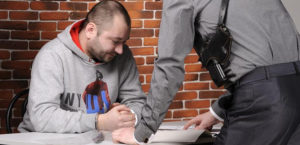Being interrogated by the police can be a frightening experience. Officers and detectives are well trained in the art of getting people to admit things about themselves that they do not want to admit. Regardless of whether you have done something wrong, you can be sure that a law enforcement agent who is convinced you have committed a crime will use every available means to find a way to make you feel like you have.
One way police try to draw a confession out of a suspect is to use the interrogation environment to their advantage. If you are suspected of committing a crime, you will likely spend hours in a brightly lit, windowless room with an uncomfortable chair. The room may be very warm or very cold. They will control when you eat, when you drink, when you use the restroom, and perhaps most importantly, whether or not you sleep. But is this a form of cruel and unusual punishment?
Studies Show Less Sleep Leads to More False Confessions
A recent study published in the Proceedings of the National Academy of Sciences shows that persons deprived of sleep are far more likely to confess to committing an act that they did not commit than people who have had a full night’s sleep.[1] In the study, researchers asked 88 university students to enter responses to a questionnaire on a computer. They were warned to not press the Escape key, as doing so would erase their data.
The group was divided in half. One group was allowed to sleep, while the other group stayed awake all night. The following day, each student received a statement accusing him or her of pressing the Escape key, and they were asked to sign a statement confirming the accusation. In reality, none of the students had done so.
The result? Only eight of the 44 students who slept confessed to the “crime,” while 22 out of the 44 who had not slept confirmed the accusation. The numbers increased to 30 students when they were asked a second time to confess to pressing the Escape key.[2]
Is Sleep Deprivation Legal?
Currently, sleep deprivation is not illegal as an interrogation tactic. Although the Eighth Amendment protects citizens from cruel and unusual punishment, courts have largely interpreted the amendment to only apply to punishment after a person has been convicted of a crime.
However, the tide may be turning on this, as the United States has come under criticism from international allies for its use of sleep deprivation in the interrogation of terrorism suspects. In 2014, the United Nations released a committee report that characterized the technique as a form of torture. However, it is noteworthy that the sleep deprivation cases mentioned in the report were of the extreme variety (up to 180 hours of forced sleep deprivation), and are unlikely to occur in a typical police interrogation.
The United Kingdom recently banned the interrogation of suspects who have not had an opportunity to sleep at least eight hours during the previous 24 hours, primarily because an increasing number of cases decided by false confessions were being overturned.
The sleep deprivation study’s numbers correlate with estimates of the number of persons who are convicted because of a false confession. According to research, a false confession played a role in 25 percent of U.S. cases where DNA evidence later exonerated a person convicted of a crime.[3]
Contact the Criminal Defense Attorneys at Wallin & Klarich Today
If you find yourself being questioned regarding a crime, the smartest move you can make to protect yourself is to exercise your right to remain silent and seek the assistance of an experienced criminal defense attorney. At Wallin & Klarich, our attorneys have over 30 years of experience fighting for the rights of clients at every stage of the criminal process, from interrogation to trial. Contact us today for a free, no obligation phone consultation.
With offices in Orange County, Los Angeles, San Bernardino, Riverside, Ventura, Victorville, West Covina, San Diego, Torrance and Sherman Oaks, there is a Wallin & Klarich attorney experienced in criminal defense available near you no matter where you work or live.
Call us today at (888) 280-6839 for a free phone consultation. We will be there when you call.
[1] Steven J. Frenda, Shari R. Berkowitz, Elizabeth F. Loftus, and Kimberly M. Fenn, Sleep deprivation and false confessions, PNAS 2016: 1521518113v1-201521518. href=”#ref1″>↩
[2] John Bohannon, “Feeling sleepy? You may confess to a crime you didn’t commit,” Science, February 8, 2016, available at http://www.sciencemag.org/news/2016/02/feeling-sleepy-you-may-confess-crime-you-didn-t-commit?. href=”#ref2″>↩
[3] Audrey Levitin, “How False Confessions and Wrongful Convictions Are Betraying U.S. Justice System,” Occupy.com, December 3, 2013, available at http://www.occupy.com/article/how-false-confessions-and-wrongful-convictions-are-betraying-us-justice-system href=”#ref3″>↩
